Marine Life & Conservation
Octopus: Passionate, fluid and subtly dissimulating
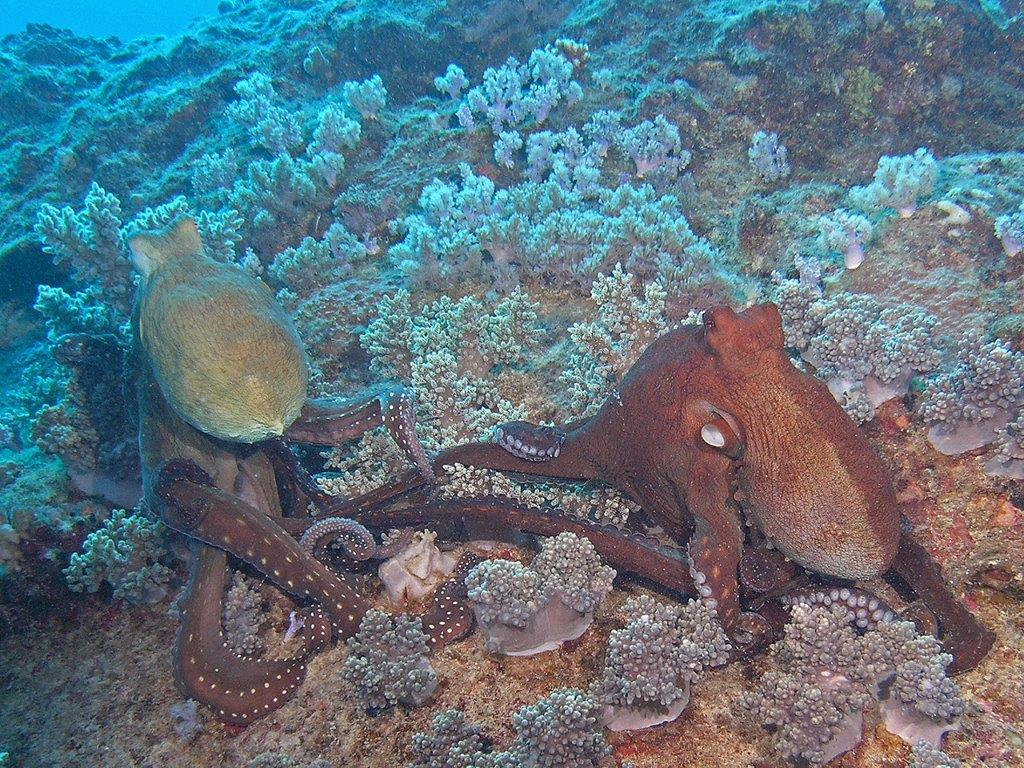
Romantic, creative and almost human in their home building behaviour, octopus feed on crabs, crayfish and molluscs, and the shells are often found around their octopus castles which are distinctive barriers of shells around the mouth of their burrows, and worth looking for around rocks and on rubble bottoms. A hole is converted into a des-res octopus style.
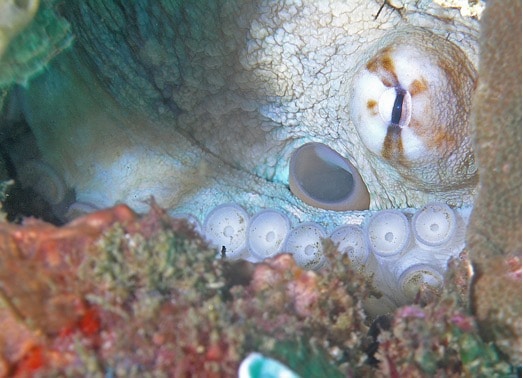
One of the most erotic events I have ever watched on the reef was on Whale Rock in Mauritius.
Exposed to the violence of the open ocean, Whale rock has few corals, but massive topography and a large and varied fish population. There we found 2 octopus behaving strangely. One of them was huge, maroon, and edging around the rock towards another huge octopus. This one was green. Octopus normally change colour according to their surroundings, so this was unusual. After a while the big red guy began to push a long black tentacle towards the green one- who began to go pale. Was this the beginning of a territorial battle? But it was not fear, it turned out to be passion.
The red guy was the male, and he was in fact offering the green female octopus a sperm parcel on his extended tentacle. When octopuses reproduce, the male uses a specialized arm to transfer the parcel from his reproductive organ into the female’s mantle cavity. The male often dies within a few weeks of mating, while the female can keep the sac stored for some months.
She was very shy, almost skittish, and flirted with him, turning white and green and edging towards him then darting away. Eventually he thrust the parcel under one of her tentacles, and she rose up into a parachute form, and turned pure white, looking just like a human bride.
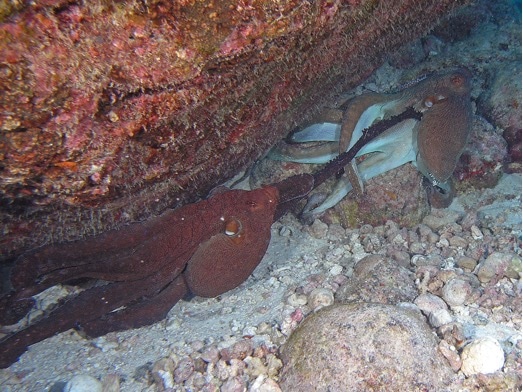
Then she seemed to go into a trance and her colour subsided back to the normal greyish colour, before they turned their backs on one another and slithering off in opposite directions. She would hold the parcel safely until her eggs were ready to fertilize. Once they have been fertilized, the female lays sometimes as many as 200,000 eggs, most of which will not survive.
Octopus can hide in plain sight, simply by changing shape and colour to protect themselves. We watched a Tomato spotted rock cod attacking an octopus. The octopus immediately changed colour and shape to exactly mimic the shape and colour of the rock cod.
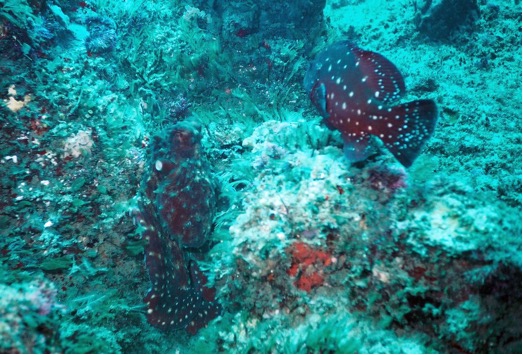
There are around 300 recognized octopus species. Octopuses do not have tentacles, they actually have 4 pairs of arms, three hearts, 2 eyes and one beak. They walk, run and swim using their arms, and if they are disturbed and afraid they will use jet propulsion to get away. If they are in mortal danger they will release a cloud of ink which contains a chemical that obscures their scent and confuses predators.
The rare and special ones can be found in Mauritius and in Indonesia where we found the mimic octopus, which has extremely long arms, and which readily mimics the surrounding fish life.
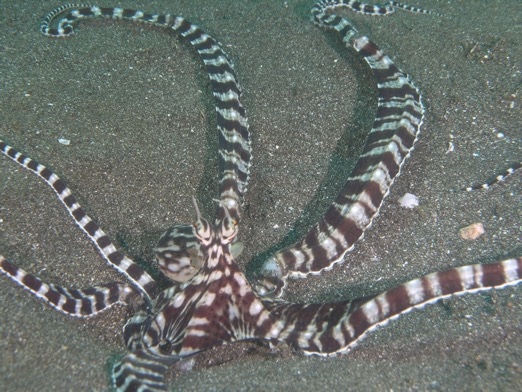
All octopus are poisonous to some extent, but the rarest, and the only one deadly to humans if the exquisite, minute blue ringed octopus, found in Indonesia and Australia.
We went to the Lembeh Straits to film him, and we really expected to see something spectacular. For two days we searched the sandy slopes and rubble bottoms. On the third day I spotted a large cockroach scuttling on its front legs along the sand. A cockroach under the sea? I pushed my Go Pro towards him, to get a close-up and he swelled up to twice the size and began to pulsate and flash iridescent blue circles. He was not a cockroach at all. He was a blue ringed octopus. The flash bulbs went crazy as the professional photographers shot pics of him, but he disappeared down a hole before I could film him.
Words Jill Holloway
Pic David Holloway
Copyright Ocean Spirit
Marine Life & Conservation
Shark Trust launches Oceanic 31 Shark Art Auction

 After a two-year tour of UK art galleries, community spaces and aquariums, the Shark Trust’s acclaimed Oceanic31 exhibition takes its final bow at the Royal Geographical Society later this month. And the unique collection of artwork, depicting 31 species of oceanic sharks and rays, donated by 31 artists, is now open for bids from art lovers and shark enthusiasts. The online auction, launched today, will close on the 7th December at 8pm (BST). The money raised will support the Shark Trust Oceanics Programme.
After a two-year tour of UK art galleries, community spaces and aquariums, the Shark Trust’s acclaimed Oceanic31 exhibition takes its final bow at the Royal Geographical Society later this month. And the unique collection of artwork, depicting 31 species of oceanic sharks and rays, donated by 31 artists, is now open for bids from art lovers and shark enthusiasts. The online auction, launched today, will close on the 7th December at 8pm (BST). The money raised will support the Shark Trust Oceanics Programme.
People can now bid on 27 of the artworks by visiting this website:
https://superstars-auctions.com/sharktrustauction
It is a chance to own a beautiful piece of original art and to support the Shark Trust. The timing of the auction also means that these would make a very special Christmas gift for any shark-lover.
- Bigeye Thresher Shark by Janina Rossiter
- Carcharodon carcharias by Jimmy Higgs
- Croc VR 2030 by Tom Mead
- Oceanic Whitetip by ATM
- Silky Street by ScapaJoe
The diversity of pieces mirrors that of the sharks and rays they represent. You can bid on paintings, digital creations, sculptures, mixed media and more. You can pick your favourite artist or species of shark. Or you can select the perfect artwork to make a statement in your home or office. Whichever you choose, you will be supporting the work to protect these amazing animals.
One of the pieces of art has been selected to be auctioned live by Steve Backshall at the For the Love of Sharks event at the Royal Geographical Society in London on the 29th November. In addition to this, two further pieces will be raffled at this event, giving people a chance to win an incredible piece of shark art. For the Love of Sharks is the Shark Trust’s flagship evening. A night to celebrate sharks. Steve Backshall is the headline speaker at this event that will see other prominent shark advocates join him on stage.
Tickets for the event can be snapped up here:
https://thesharktrust.org.uk/Event/flos24
Those that would like to see the Oceanic 31 exhibition have one final chance. It is being displayed at the Pavilion at the Royal Geographic Society from 26th November until the 7th December. Entry is free.
Find out more here:
https://www.rgs.org/events/upcoming-events/oceanic-31
Paul Cox, Shark Trust CEO, Said “This exhibition has given us the opportunity to reach out to a new audience. And inspire more people with the wonderful sharks and rays on which our Big Shark Pledge campaign is based. We are immensely grateful to the 31 artists who have worked so hard to create these works.”
Bid for your favourite Oceanic 31 artwork here:
https://superstars-auctions.com/sharktrustauction
Banner Image: Smooth Hammerhead by Alicia Hayden
Marine Life & Conservation
Meet Steve Backshall in the Bite-Back Prize Draw

Until 28 November, prizes worth a massive £10,000 – including experiences, products and tuition – feature in a line-up of items that can be won for £5 in an online prize draw to celebrate Bite-Back Shark & Marine Conservation’s 20th anniversary and help generate crucial funds for the future.
Top of the list of prizes is the chance to spend time with adventurer and wildlife expert Steve Backshall, a workout session with Nat Geo star Aldo Kane, a kayaking trip alongside white-water expert and diver Sal Montgomery and a Zoom call with ‘shark whisperer’ Cristina Zenato.
On top of that, some of the most admired companies in the diving and scuba industry have been quick to support the charity with fabulous prizes that make the £5 ticket price worth more than just a flutter.
Master Liveaboards, BSAC, Midlands Diving Chamber, Go Freediving and Blue Shark Snorkel have all generously donated experience prizes, while celebrated photographer Alex Mustard has donated a print and artists Scott Gleed and Olivier Leger have donated a sculpture and illustration to help boost the fundraising pot.
Fourth Element has donated Ocean Positive gear and LA watch company Nodus has gifted the charity a stunning dive watch. For land lovers, the charity has included a five star London hotel stay at Bankside Hotel plus a family visit to Longleat Safari Park in the roster of prizes.
Campaign director for Bite-Back, Graham Buckingham, said: “We’ve been overwhelmed with support from companies and individuals that we truly admire and who have supported us on our 20 year journey and we’re truly grateful to them all. While we feel incredibly proud of our achievements over the past two decades – and we are super excited about the next chapter – this prize draw isn’t a vanity project. It represents a real lifeline to our work and important advancements in the global protection of sharks. So we hope divers, dive clubs and even bargain hunters grab some tickets to make this a massive success.”
The charity hopes that the prize draw will generate crucial funds to launch a brand new, ground-breaking, campaign to enrol the public and increase support for the protection of sharks around the world.
To enter the competition visit www.bite-back.com/prizedraw. The prize winners will be announced on 1 December 2024.
-

 News1 month ago
News1 month agoIconic SS United States to become the World’s Largest Artificial Reef
-

 Blogs3 months ago
Blogs3 months agoNovoScuba’s Game-Changing Approach for Dive Store Owners: WE PAY YOU!
-

 News2 months ago
News2 months agoBook Review – 52 Assignments: Underwater Photography
-

 Gear News2 months ago
Gear News2 months agoDYNAMICNORD – New German diving brand enters the British market
-

 News2 months ago
News2 months agoExploring Cenote El Pit: A Diver’s Dream
-

 Gear News2 months ago
Gear News2 months agoTry BARE drysuits (and maybe even win one!) this Friday with Sea & Sea at North West Dive Fest
-

 News3 months ago
News3 months agoComing Soon – 52 Assignments
-

 News3 months ago
News3 months agoSave £200 per person per week at Pole Pole Lodge with Dive Worldwide








